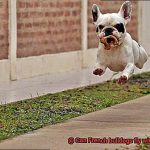Can French Bulldogs get aggressive?
Imagine the squishy face of a French Bulldog, those adorable bat-like ears that perk up when they hear your voice, and that playful nature that has made them famous all over the world. From viral videos showcasing their hilarious antics to their unwavering love and affection, French Bulldogs have undoubtedly stolen our hearts.
But as a responsible pet owner, it’s crucial to dig deeper into their temperament to truly understand their needs, behavior, and any potential challenges that may arise. So here’s the burning question: can French Bulldogs actually get aggressive?
In this blog post, we’re going to debunk common misconceptions about these lovable pups and explore what factors contribute to canine aggression in general. Our goal is simple – to arm current and future French Bulldog parents with the knowledge and tools they need to create a safe and loving environment for their furry friends.
So grab yourself a cup of tea (or coffee if you prefer) and get ready as we embark on this enlightening journey. We’ll separate fact from fiction, unveil the truth about French Bulldogs and aggression, and leave you with a comprehensive understanding of these amazing creatures. Let’s dive right in.
Factors That Can Lead to Aggression in French Bulldogs
Contents
- 1 Factors That Can Lead to Aggression in French Bulldogs
- 2 The Role of Genetics and Socialization in French Bulldog Aggression
- 3 Signs of Aggression in French Bulldogs
- 3.1 Growling: A Vocal Warning
- 3.2 Barking and Lunging: Fear or Territory?
- 3.3 Snapping and Biting: Extreme Forms of Aggression
- 3.4 Subtle Signs: Hints of Aggression
- 3.5 Understanding the Underlying Causes
- 3.6 Taking Action: Seek Professional Guidance
- 3.7 Prevention through Socialization
- 3.8 Positive Reinforcement Training: Setting Boundaries
- 4 How to Prevent and Address Aggression in French Bulldogs
- 4.1 Early Socialization: Building Confidence from the Start
- 4.2 Training and Obedience: Building Trust and Boundaries
- 4.3 Mental and Physical Stimulation: Channeling Energy Positively
- 4.4 Consistency in Discipline: Establishing Clear Expectations
- 4.5 Recognizing Signs of Aggression: Prompt Intervention is Key
- 5 Training Tips for Dealing with Aggressive Behavior in French Bulldogs
- 6 When Should You Seek Professional Help for Your Dog’s Aggression?
- 7 Is It Possible to Change an Aggressive Dog’s Behavior?
- 8 Common Mistakes When Dealing with an Aggressive Dog
- 9 Conclusion
French Bulldogs are known for their adorable appearance and friendly disposition, making them a popular choice as family pets. However, like any breed, French Bulldogs can exhibit aggressive behavior under certain circumstances. In this article, we will delve into the various factors that can contribute to aggression in French Bulldogs and provide valuable insights to help owners better understand and address this issue.
Genetics: The Role of Ancestry
French Bulldogs, just like humans, can inherit certain traits from their parents. Genetic predisposition to aggression can be present in some bloodlines. This is why it’s crucial to choose a reputable breeder who prioritizes breeding dogs with stable temperaments. Responsible breeders will carefully select parents for their puppies to minimize the risk of inheriting aggressive tendencies.
The Power of Socialization
Socialization is a critical aspect of a dog’s development, and French Bulldogs are no exception. Proper exposure to various people, animals, and environments during their crucial socialization period (between 3 and 14 weeks of age) is vital. Insufficient socialization can lead to fear or aggression towards unfamiliar situations or individuals later in life.
Fear and Anxiety: Silent Aggressors
Fear and anxiety can manifest in aggressive behavior as a defense mechanism. Traumatic experiences, lack of exposure to new environments or stimuli, or even genetic predisposition can contribute to fear-based aggression in French Bulldogs. Identifying and addressing the root cause of fear or anxiety is essential to prevent aggressive behavior.
Guarding Resources: Minimizing Possessive Aggression
French Bulldogs might display aggression when it comes to protecting their resources, such as food, toys, or sleeping areas. This behavior stems from their instinctual need to ensure survival and dominance over valuable possessions. By implementing proper training and management techniques early on, resource guarding tendencies can be minimized.
The Power of Obedience Training
A well-trained French Bulldog is less likely to exhibit aggressive behavior. Dogs that haven’t received proper obedience training may not know how to respond appropriately in various situations, leading to frustration and potential aggression. Establishing clear boundaries, consistent training, and positive reinforcement are essential for preventing aggression.
Medical Factors: Uncovering Underlying Issues
It’s crucial to rule out any underlying medical conditions that could contribute to aggression in French Bulldogs. Pain, hormonal imbalances, neurological disorders, or certain medications can all impact a dog’s behavior. Consulting with a veterinarian is crucial in such cases to ensure appropriate treatment is provided.
The Role of Genetics and Socialization in French Bulldog Aggression
When it comes to understanding aggression in French Bulldogs, two key factors come into play: genetics and socialization. Let’s take a closer look at how these factors interact and shape a French Bulldog’s personality.
Genetics:
Just like humans inherit certain traits from their parents, French Bulldogs also inherit certain characteristics from their lineage. While aggression is not a trait specifically bred for in French Bulldogs, genetic factors can still influence their behavior. Some French Bulldogs may have a genetic predisposition towards aggression due to the influence of certain genes.
Research has shown that specific genes can be associated with aggressive behavior in dogs. These genes can affect various aspects of a dog’s temperament, including their response to stressful situations, fearfulness, and reactivity. However, it is important to note that genetics alone do not determine a French Bulldog’s behavior. Environmental factors and socialization also play critical roles.
Socialization:
Socialization refers to the process of exposing a dog to various experiences, people, animals, and environments from an early age. This process helps them develop appropriate social skills and learn how to interact with the world around them. Proper socialization is essential for all dogs, including French Bulldogs, as it significantly impacts their behavior and reduces the likelihood of aggression.
When French Bulldogs are not adequately socialized during their critical developmental period (typically between 3 to 14 weeks of age), they may become fearful or anxious in unfamiliar situations. This fear or anxiety can manifest as aggression when they feel threatened or overwhelmed. It is crucial to expose French Bulldogs to different people, animals, places, and stimuli during this period to help them become well-adjusted and confident adults.
While genetics can play a role in a French Bulldog’s predisposition towards aggression, proper socialization can mitigate these tendencies. Even if a French Bulldog has genetic factors that make them more prone to aggression, early and positive experiences can help shape their behavior and reduce the likelihood of aggressive responses.
Proactive socialization efforts should include exposing French Bulldogs to a variety of situations, such as different types of people (including children), other animals, various environments (both indoor and outdoor), and different sounds and stimuli. Additionally, positive reinforcement training techniques can be employed to teach them appropriate behaviors and responses.
It is important for French Bulldog owners to be aware of the potential genetic factors that may contribute to aggression and take proactive steps to ensure proper socialization. Seeking guidance from professional trainers or behaviorists can provide expert advice on how to effectively socialize a French Bulldog and address any behavioral issues that may arise.
By understanding the role of genetics and socialization in French Bulldog aggression, owners can take the necessary steps to promote a well-behaved and non-aggressive companion.
Signs of Aggression in French Bulldogs
French Bulldogs are renowned for their friendly and sociable nature, but like any breed, they can exhibit signs of aggression under certain circumstances. As a responsible owner, it’s crucial to be aware of these signs to ensure the well-being of your furry companion and those around them. In this comprehensive guide, we will explore the various signs of aggression in French Bulldogs and provide practical advice on prevention and intervention.
Growling: A Vocal Warning
When a French Bulldog growls, it’s a clear indication that they feel threatened or uncomfortable. This behavior can occur when approached by unfamiliar people or animals, or when their personal space is invaded. It is essential to respect their boundaries and give them space during these instances.
Barking and Lunging: Fear or Territory?
Excessive barking and lunging are often triggered by fear or territorial instincts. If your French Bulldog becomes vocal and exhibits aggressive body language towards someone or something, take note of the underlying cause and address it promptly.
Snapping and Biting: Extreme Forms of Aggression
Snapping and biting are severe forms of aggression that should never be ignored. If your French Bulldog displays these behaviors, seek professional help immediately. These actions can pose a threat to humans or other animals and require immediate intervention.
Subtle Signs: Hints of Aggression
In addition to overt signs, French Bulldogs may display subtle indications of aggression before more aggressive behaviors manifest. Raised hackles, stiff body posture, intense staring, and showing teeth are all warning signs that your dog feels threatened.
Understanding the Underlying Causes
Aggression in French Bulldogs can stem from various factors, including genetics, lack of socialization, fear, pain, or previous traumatic experiences. Identifying the root cause is crucial in addressing the issue effectively and tailoring a behavior modification plan.
Taking Action: Seek Professional Guidance
If you observe any signs of aggression in your French Bulldog, it’s essential to take immediate action. Consult with a veterinarian or certified dog behaviorist to assess the situation, identify the underlying cause, and develop a tailored training and behavior modification plan.
Prevention through Socialization
Early socialization is key to preventing aggression in French Bulldogs. Expose them to different people, animals, and environments from a young age to build their confidence and reduce the likelihood of aggressive behaviors.
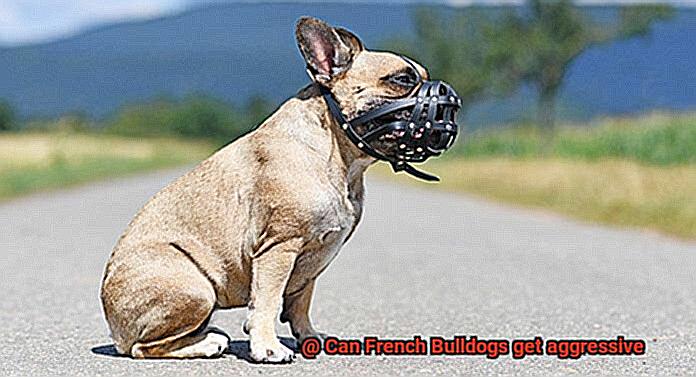
Positive Reinforcement Training: Setting Boundaries
Consistent and positive reinforcement training is essential in establishing clear boundaries and reinforcing desirable behaviors. This approach significantly reduces the chances of aggression in French Bulldogs.
How to Prevent and Address Aggression in French Bulldogs
French Bulldogs are beloved companions known for their friendly and affectionate nature. However, like any dog breed, they can display aggression under certain circumstances. Understanding the underlying causes and taking proactive steps can help prevent and address aggression in these adorable pups. In this guide, we will explore effective strategies to ensure the well-being of your French Bulldog and foster a harmonious bond between you and your furry friend.
Early Socialization: Building Confidence from the Start

Early socialization is key to preventing aggression in French Bulldogs. Expose them to various people, animals, and environments from a young age to help them develop positive associations. Gradually introduce them to new experiences, rewarding calm and friendly behavior. This will reduce the likelihood of fear-based aggression later in life.
Training and Obedience: Building Trust and Boundaries
Training your French Bulldog is essential for preventing aggression. Teach them basic commands, such as sit, stay, and leave it, using positive reinforcement techniques. Consistent training helps establish boundaries and builds a strong bond between you and your pup.
Mental and Physical Stimulation: Channeling Energy Positively
French Bulldogs require both mental and physical stimulation to prevent boredom-related aggression. Engage them with regular exercise, interactive toys, and puzzle games that challenge their minds. A tired dog is a happy dog.
Consistency in Discipline: Establishing Clear Expectations
Consistency is crucial when disciplining your French Bulldog. Establish clear rules and boundaries that are consistently enforced. Avoid confusing or contradictory commands, as it can lead to frustration and potentially aggressive behavior.
Recognizing Signs of Aggression: Prompt Intervention is Key
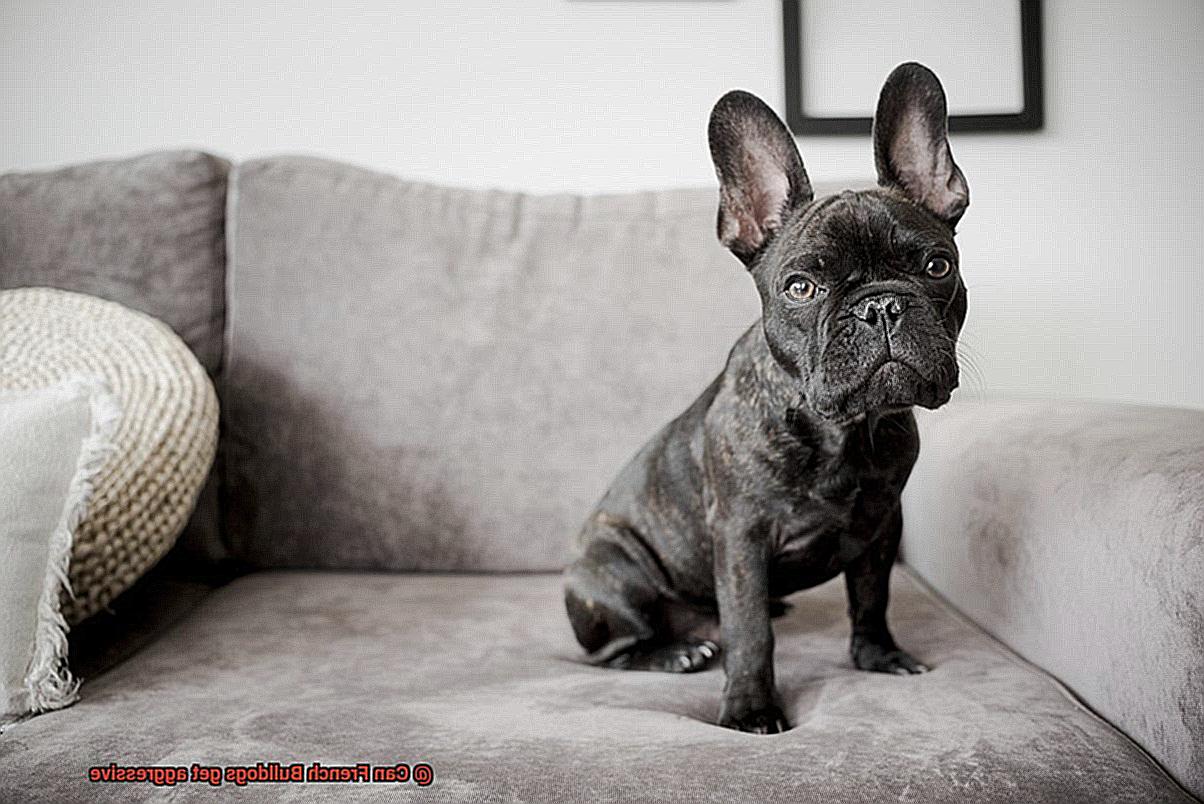
It is vital to recognize the warning signs of aggression in French Bulldogs. Growling, snapping, biting, or stiff body language are indications that your dog may be feeling threatened or anxious. Prompt intervention by seeking professional help is essential to address and modify the behavior effectively.
Training Tips for Dealing with Aggressive Behavior in French Bulldogs
French Bulldogs are known for their friendly and affectionate nature, but like any breed, they can display aggressive behavior under certain circumstances. It is essential to address aggression in French Bulldogs early on to prevent harm to others and ensure a happy and well-behaved pet. In this article, we will discuss training tips for dealing with aggressive behavior in French Bulldogs.
Identify Triggers:
The first step in addressing aggression is to identify the triggers that provoke the dog. This may include specific situations, objects, or individuals. By recognizing these triggers, you can avoid exposing your French Bulldog to them whenever possible.
Positive Reinforcement:
Implementing positive reinforcement techniques is highly effective in modifying aggressive behavior. Rewarding desired behaviors with treats or praise and redirecting negative behaviors helps reshape your dog’s response. Consistency is key to reinforcing positive behaviors.
Seek Professional Help:
If your French Bulldog’s aggression becomes unmanageable or poses a risk to others, seek assistance from a professional dog trainer or behaviorist experienced in dealing with aggression. They can provide tailored guidance and develop effective training strategies.
Avoid Punishment-based Training:
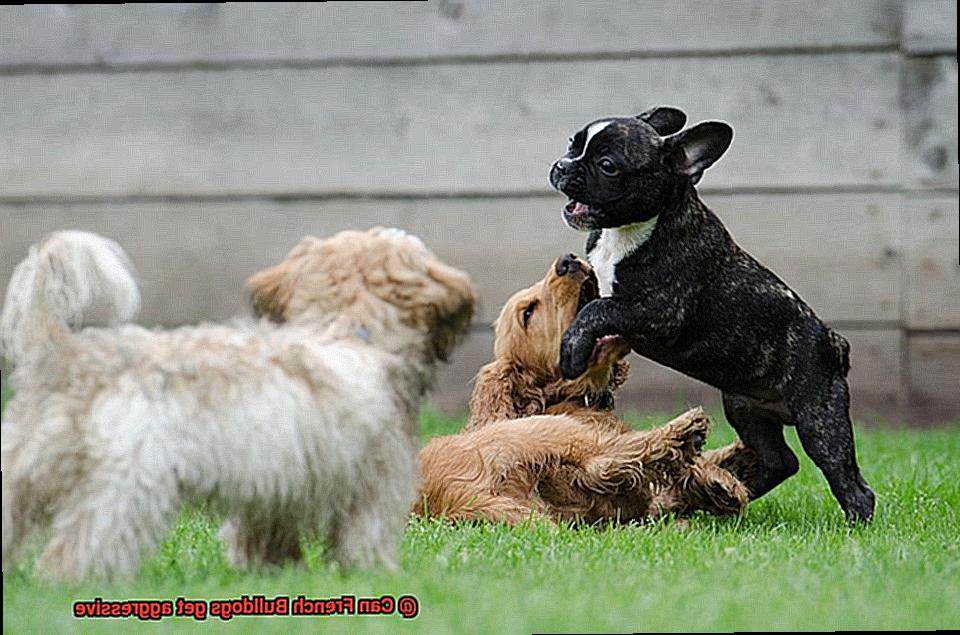
Punishment-based training methods should be avoided when dealing with aggression. These methods can increase fear and anxiety, potentially exacerbating the aggressive behavior. Focus on positive reinforcement techniques to create a safe and trusting environment.
Provide Mental and Physical Stimulation:
Regular exercise, interactive toys, and obedience training provide mental and physical stimulation for your French Bulldog. This helps alleviate stress and reduces the likelihood of aggressive outbursts.
Socialization is Key:
Proper socialization from an early age is crucial in preventing aggression. Introduce your French Bulldog to different environments, people, and animals in a controlled manner. This will help them become confident and comfortable in various situations.
When Should You Seek Professional Help for Your Dog’s Aggression?
When to Call in the Pros: Dealing with Aggression in Your French Bulldog
French Bulldogs are often known for their friendly and affectionate nature. However, like any dog, they can sometimes display aggression. Knowing when to seek professional help for your French Bulldog’s aggression is crucial for their well-being and the safety of those around them. In this article, we will explore the signs that indicate professional intervention is necessary and how it can greatly improve your dog’s behavior.
Recognizing the Signs
Aggression in French Bulldogs can manifest in various ways, such as growling, snarling, snapping, or biting. If your furry friend displays these behaviors towards people or other animals on a regular basis, it’s a red flag indicating the need for professional help.
Escalating or Frequent Aggression
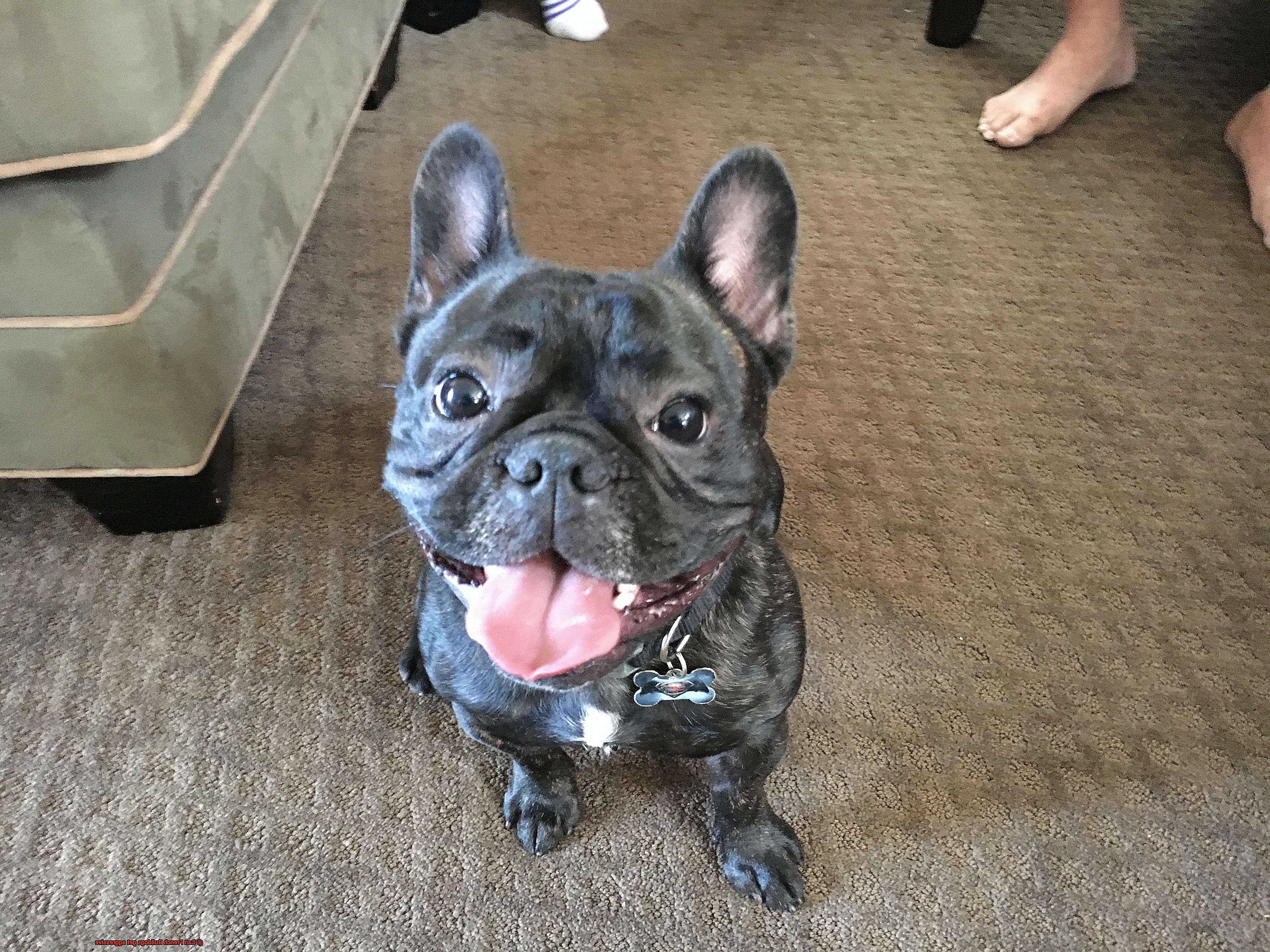
If your French Bulldog’s aggressive episodes are increasing in intensity or becoming more frequent, it is time to seek professional intervention. This behavior can be a sign of an underlying issue that needs to be addressed by a trained expert.
Harm or Injury
If your French Bulldog’s aggression is causing harm or injury to others or even yourself, seeking professional help is crucial. A professional dog trainer or behaviorist can assess the situation and provide guidance on how to manage and modify your dog’s behavior effectively.
Negative Impact on Daily Life
Aggression in your French Bulldog can have a significant impact on your daily life and relationships. If this behavior is causing stress, fear, or anxiety for you or those around you, it’s time to reach out to a professional.
The Benefits of Professional Help
A professional dog trainer or behaviorist has the expertise to assess your French Bulldog’s aggressive behavior accurately. They will develop a customized training plan tailored to your dog’s specific needs. With their guidance and support, you’ll learn effective techniques to address the aggression and modify your dog’s behavior positively.
In some cases, medication may be prescribed by a veterinarian to help manage your French Bulldog’s aggression. A professional can work in conjunction with your veterinarian to ensure the best course of action is taken.
Remember, it’s essential to seek professional help early on rather than waiting for the aggression to worsen or become unmanageable. With timely intervention, you can greatly improve your French Bulldog’s behavior and overall quality of life for both you and your furry friend.
Is It Possible to Change an Aggressive Dog’s Behavior?
French Bulldogs are known for their charming personalities and affectionate nature. However, like any breed, they can exhibit aggression if not properly trained and socialized. The good news is that with the right techniques and dedication, it is possible to change an aggressive dog’s behavior. In this article, we will explore effective training techniques and behavior modification strategies specifically tailored for French Bulldogs.
Understanding the Root Causes of Aggression:
Aggression in French Bulldogs can be triggered by various factors such as fear, territoriality, possessiveness, or learned behavior. Identifying the underlying cause is crucial to address it effectively. Seek the assistance of a professional dog trainer or animal behaviorist to help you determine the root cause of your Frenchie’s aggression.
Training Techniques That Work:
- Positive Reinforcement: Use treats, praise, and play as rewards for desirable behaviors such as remaining calm and non-aggressive. Show your Frenchie that good behavior leads to positive outcomes.
- Desensitization: Gradually expose your dog to situations or stimuli that trigger aggression in a controlled and non-threatening manner. For example, if your Frenchie becomes aggressive around other dogs, start by introducing them to calm and friendly dogs from a distance and reward them for calm behavior.
- Counter-Conditioning: Change your Frenchie’s emotional response to specific triggers by associating them with positive experiences. For instance, if your dog reacts aggressively when meeting new people, have those people offer treats or engage in activities that your Frenchie enjoys.
Consistency and Patience:
Changing an aggressive dog’s behavior takes time and consistency. Be patient with your Frenchie as they learn new behaviors and always reward good behavior. Remember that consistency is key to successful behavior modification.
When Medication May Help:
In some cases, medication prescribed by a veterinarian may be necessary to manage underlying medical or psychological issues contributing to aggression. However, medication should always be used in conjunction with behavior modification techniques and under professional guidance.
Seeking Professional Help:
Working with an aggressive dog can be challenging, and seeking professional help is highly recommended. A qualified dog trainer or behaviorist can create a tailored plan based on your Frenchie’s specific needs, ensuring the safety of both your dog and those around them.
Common Mistakes When Dealing with an Aggressive Dog
French Bulldogs are known for their playful and affectionate nature, but like any other breed, they can display aggressive behavior if not properly trained and socialized. Dealing with an aggressive French Bulldog requires understanding and avoiding common mistakes that can exacerbate the problem. In this section, we will discuss these mistakes and provide tips on how to handle aggression in French Bulldogs effectively.
Mistake 1: Reacting with Fear or Anger
When faced with an aggressive French Bulldog, it is natural to feel afraid or angry. However, reacting with fear or anger can escalate the situation and reinforce the dog’s aggressive behavior. Dogs are highly perceptive animals and can pick up on our emotions. It is crucial to remain calm and composed when dealing with an aggressive French Bulldog.
Mistake 2: Failing to Identify Triggers
Understanding what triggers your French Bulldog’s aggression is essential in managing their behavior. Common triggers include fear, resource guarding, or feeling threatened. By identifying these triggers, you can avoid situations that may provoke aggression or implement training methods to desensitize your dog.
Mistake 3: Lack of Proper Socialization
Proper socialization is crucial for all dogs, including French Bulldogs. Exposing them to different environments, people, animals, and situations from an early age can help reduce aggression. It teaches them how to interact appropriately and builds their confidence. Neglecting socialization can lead to fear-based aggression in French Bulldogs.
Mistake 4: Inconsistent Training
Consistency is key when training an aggressive French Bulldog. Inconsistent training methods can confuse the dog and hinder progress. Establish clear rules and boundaries, and ensure that all family members follow the same training techniques. This consistency will help your French Bulldog understand expectations and reduce aggression.
Mistake 5: Using Punishment-Based Training Methods
Using punishment-based training methods is a common mistake when dealing with an aggressive French Bulldog. These methods can worsen aggression and damage the trust between you and your dog. Instead, opt for positive reinforcement techniques. Reward desired behaviors and redirect or ignore unwanted ones. This will encourage your French Bulldog to display more desirable behaviors.
Mistake 6: Neglecting Professional Help
Dealing with aggression in French Bulldogs can be challenging, and seeking the assistance of a professional dog trainer or behaviorist is highly recommended. They have the expertise to assess your dog’s behavior, identify the underlying causes of aggression, and develop a customized training plan. Professional help can make a significant difference in managing and modifying your French Bulldog’s aggressive behavior.
EvweYG93oF0″ >
Conclusion
In conclusion, it is important to acknowledge that French Bulldogs, like any other breed, have the potential to display aggression. While they are generally known for their friendly and affectionate nature, certain factors can trigger aggressive behavior in these adorable pooches.
It is crucial for owners to understand that aggression in French Bulldogs can stem from various sources such as fear, territoriality, or even genetic predisposition. Early socialization and proper training play a vital role in preventing and managing aggressive tendencies.
Furthermore, it is essential to note that aggression should never be tolerated or encouraged. If you notice any signs of aggression in your French Bulldog, seeking professional help from a qualified dog trainer or behaviorist is highly recommended.
Remember, a well-rounded and balanced French Bulldog is a result of responsible ownership and consistent training. By providing them with a loving environment, proper socialization, and positive reinforcement techniques, you can help ensure that your furry friend remains happy and non-aggressive.



